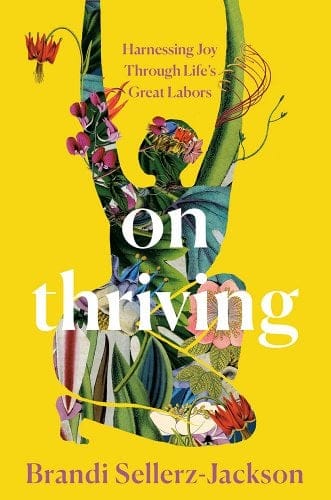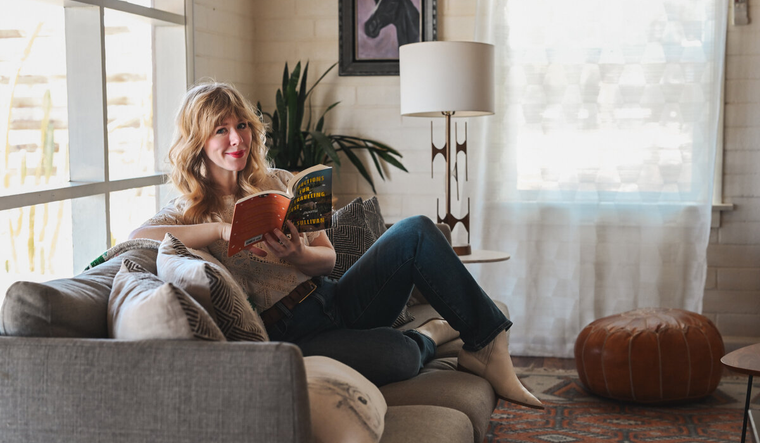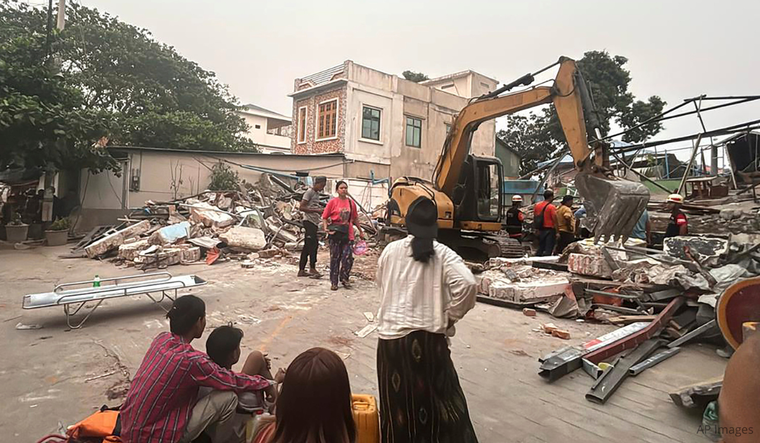From Racism to Bigotry to Political Divisiveness, We All Have Been Othered in Some Way. Brandi Sellerz-Jackson Has the Roadmap to Healing
In On Thriving: Harnessing Joy Through Life's Great Labors, Brandi Sellerz-Jackson's new book, there's a scene in which the author tells of her early memories of feeling othered. During the sweltering summers of her youth, Sellerz-Jackson and her cousins would venture into town, where they would bump into people. Some strangers would search her face and those of her cousins, "looking for similarities" and making comparisons, she recalls. "I could hear their assumption in their body language. They would address my lighter-skinned cousins, not me. Or they would say to my lighter-skinned relative, 'So this is your cousin?' and exclude me altogether," writes Sellerz-Jackson. "I remember, at that moment, feeling different. Other."
In many ways, that moment is a microcosm of the countless moments Sellerz-Jackson has experienced racism and othering in her life. She shares this in her book, On Thriving, while offering an inclusive, compassionate, all-encompassing look at how othering impacts all of us, regardless of race, background, or identity. "I don't see any of us not experiencing it at some point in our lives," she tells The Sunday Paper, noting that othering—the act of distancing or stigmatizing another—happens in many forms, from workplace othering to age and body discrimination to news headlines. "And I really thought this through," she adds.
Othering robs us of our humanity, Sellerz-Jackson tells us. But the essential point here is how we can thrive and heal in the face of it, she believes. With her rich talent for storytelling and ability to make people feel seen, a trait that buoys her work as a birth and life doula, Sellerz-Jackson offers the light on how we can do just that, and stay hopeful and strong.
A CONVERSATION WITH BRANDI SELLERZ-JACKSON
Let’s start with your work. You’re a birthing and postpartum doula, and also a life doula. How did you start working as a life doula?
I started calling myself a life doula in 2020 after I'd been working as a birth and postpartum doula. During the pandemic, doulas weren't allowed, for the most part, in the hospitals. People weren't having doulas over to their houses, either. There was so much isolation, as we know. So, I ended up doing births over the phone— literally, doula-ing people over the phone. During that time, I started getting these phone calls from friends and parents I'd helped, asking if I would help their friends. They'd say, 'I have this friend, she doesn't need anything about birthing support, but she just needs you to help her figure out how to deal with her in-laws or her partner or this big life event. Can you talk to her?' At first, it was jarring because I thought, This isn't breastfeeding or birth or postpartum support? It was talking, and it was listening.
It reminds me of this moment I had with a dear sister-friend, whom I write about in the book. We were talking one Saturday morning and saying, 'Wouldn't it be great to have someone who could doula us through life? To help us through those really hard and transitional moments, like birth?' So that’s how it started.
You write that we all go through "four great labors" in life—relationships, mental health, grief and loss, and being othered—no matter our background, identity, age, or economic status. How do you see othering happening in our world today?
We all experience it or will experience it in some way. I've thought, Are there any groups of people or humans that won't experience this? I have thought of someone in a new workplace or older going into the workplace. I have thought of an elder coming out of retirement and going back into the workforce. I have thought about how we see this with different body sizes, disabilities, skin colors, sexualities, and genders. I don't think any of us are exempt from othering. Unfortunately, we will all be touched by it at some point. And so, the question is, how do we thrive in that space?
You share many personal instances about being othered that make up the quilt that is your book. In respect to all your stories and experiences, what are a few you're willing to share?
I grew up in the South in the 80s. There was no such thing as summer camp. We all went to someone's house and played outside. At the time, all my cousins my age were lighter complected. And I look like my biological father; I have really dark skin. And I remember going places with my cousins and immediately feeling it. It's one of those things when you know, you know. I could feel people assuming I was the friend of the family or I was somebody else—even though Black folks come in all shapes and colors! I remember thinking I didn't look like them, and that made me feel other. Also, it wasn't so diverse regarding Black women on screen back then. I didn't have many people who looked like me to look up to. Then you start to question, Who do you look like? Does that mean I'm not beautiful? Does that mean that I'm not worthy of love?
This all continued through my life. I went to a predominantly white college, where there were so many little things. So, I've had to learn how to exist and thrive in the midst of that. I've had to learn to look at [othering] not as something that is going to hinder me but as something that can build me in the process.
There is deep and heartbreak in listening to this. When we other people or when we experience othering, how does it hurt us?
When you other people, you don't see them as human. Look at George Floyd. The reason why that police officer was able to stand on his neck is because he didn't see him in his humanity. He didn't see him as someone's son, just as he is someone's son. He didn't see him as someone's brother, nephew, cousin, or friend. So when we don't see one another, we rob each other of our humanity. When I don't see you, I can't have empathy for you.
At the core of this, it's seeing that someone is no different than you. Yes, we have different stories. But at the core of it, we literally are the same. We all need the same things. We all need love. We all need to be seen and heard. We are all trying to figure this out and work through our own individual stories.
How can we resist othering and thrive in the face of it?
I love the idea of the mealybugs, which I write about. [Mealybugs] are the little things that we don't think are affecting us, but they are. These are the little things that we don't think are a big deal, but they drain and deplete us. You develop a thick skin to shake things off when you've been othered. So, I have had to learn to pay attention to how things make me feel, no matter how small they are. Even if it is as small as a little mealybug, little by little, the more it comes up, the more draining it becomes. So, I encourage people to pay attention to the little, nuanced things that they may not immediately think are a big deal, but the weathering and weight from them are big.
I also talk about rest. That was one of my favorite parts of the book to write because I got to talk with my grandmother. I wanted to interview her about how she and her mother, my great-grandmother, viewed rest in a segregated South. There was Jim Crow and racism; how did they find rest? She said rest for them was playing baseball on a Sunday. When I close my eyes, I can see them in the country, playing baseball on this plot of grass. She told me that they would also cook dinner for each other. I remember that part. I remember being home as a little girl with all these aunts, uncles, and everybody cooking all this food that was just this big old pot of nourishment. They cooked for each other, they supported each other, they loved on each other. They found their way. And that's what I gathered from this: They knew that in the midst of this othering and hardship, they had to find it, just how the folks before them, our ancestors, had to find it. They had to go north. They knew that this world would be what it was; they needed to find their happiness, joy, and freedom. So, I encourage people to take notes from this way of thinking. And unfortunately, sometimes joy doesn't just happen. Especially when you are othered. You must go find it, actively seek after it, and guard your peace and joy.
What is your advice for better attuning ourselves to othering that's happening around us so we can thwart it and be in advocacy with those who are being othered?
When you see it, be the support that you would need. Because, again, we all experience it and will experience it. If you see someone out in the world, on the job, or if someone confides in you, be the support that you would want and need if you were othered. That can look different for everything and everyone. Sometimes, it's using the privilege that you have to support people who may be feeling othered and disenfranchised in that moment.
Also, be present. People underestimate what a listening ear does. Just being there to listen, not trying to fix anything, just to listen and say, 'Hey, I'm here,' is such a beautiful thing.

Brandi Sellerz-Jackson is a storyteller; life, birth, and postpartum doula; the creator of Not So Private Parts, a platform that aims to remove the stigma surrounding women’s issues; and the co-founder of Moms in Color. Follow her at @BStereo.
Please note that we may receive affiliate commissions from the sales of linked products.



